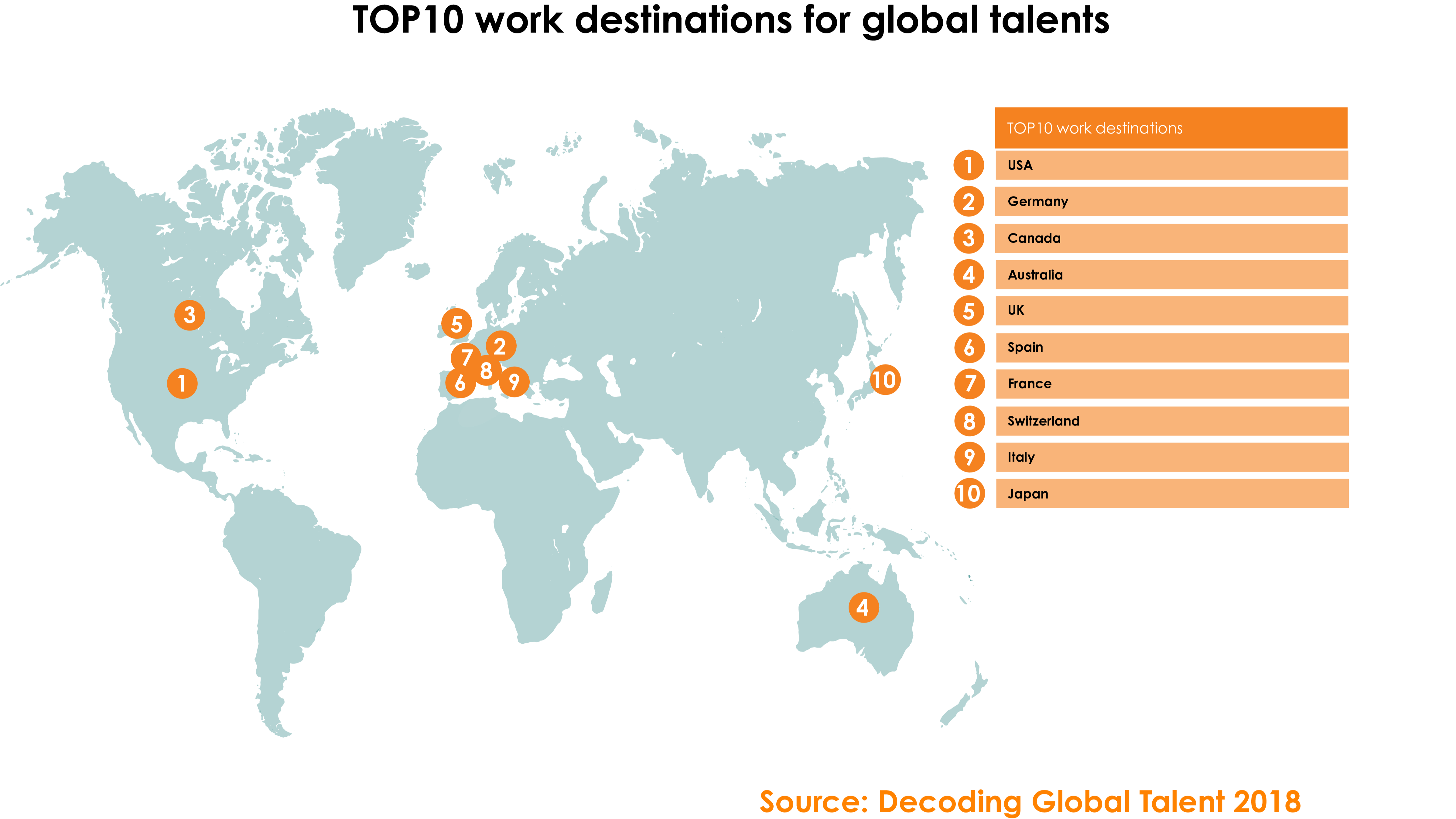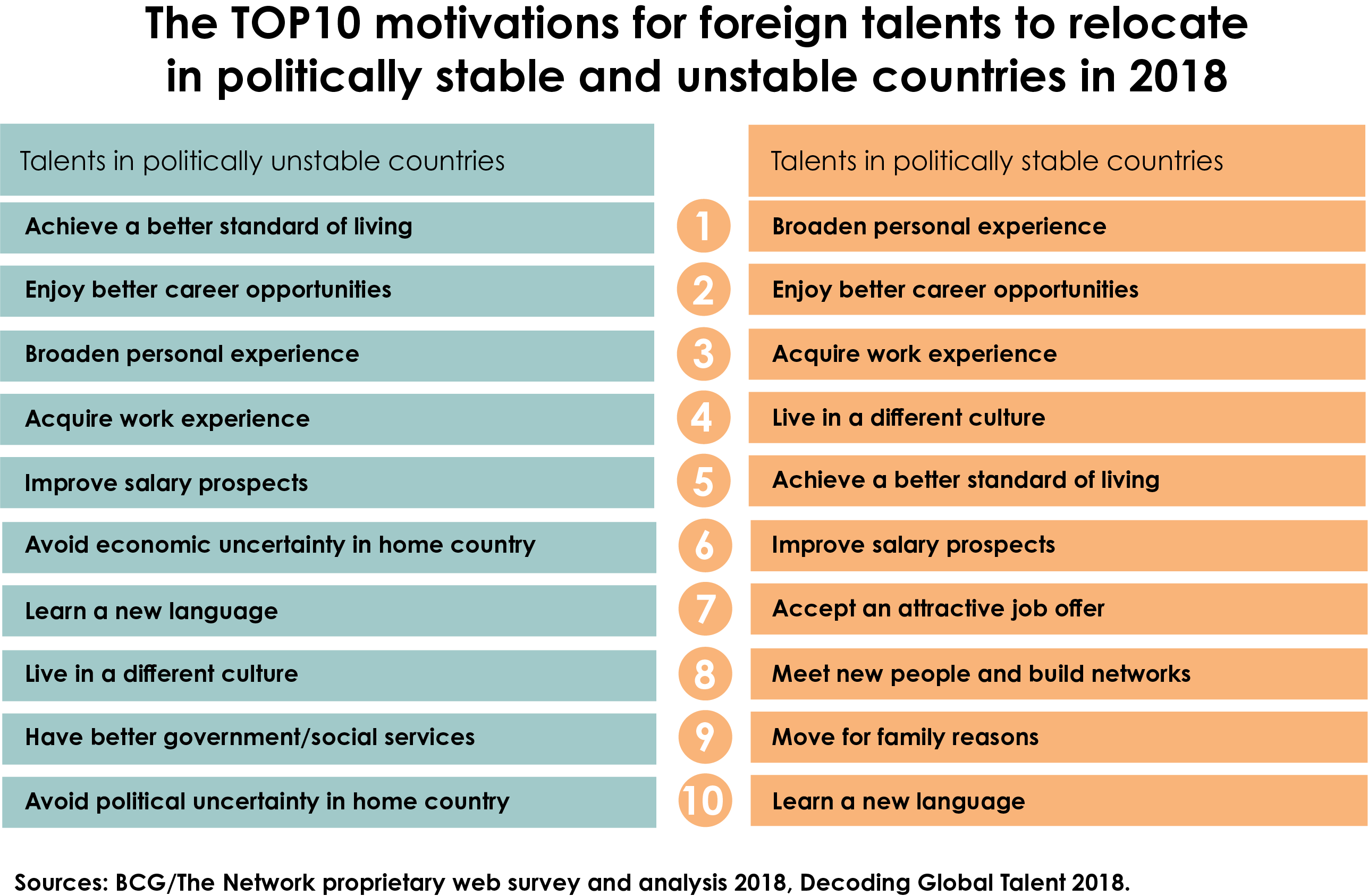Finnish working life needs foreign talents. According to researchers, Finland is one of the best countries in the world to work and to live.
However, few foreigners want to move here. For this reason, a national strategy aiming to attract talents to Finland is needed. Immediate measures are also needed to root foreigners who already live, work, and study here in the Finnish working life. Companies and higher education institutions, in particular, have a key role in promoting multiculturalism.
The definition of a talent or a skilled worker has expanded in the global employment market. Talents have the required skills, but they are also committed and have the desire to make their work significant. This is why countries that compete for the talents – i.e., nearly all developed countries – go beyond simply attracting skilled workers by also developing their attractiveness in order to make skilled people stay longer.
Talent = competence × commitment × contribution
Ulrich&Smallwood 2012
Business Finland, a public operator that promotes the internationalisation of Finland, summarises the country’s strengths as follows: In Finland everything works. The description is apt – but does everything work?
The situation of the Finnish labour market – i.e., the need for 100,000 new employees by 2022, the shortage of tens of thousands of employees in filling new vacancies, and the foreign labour and foreign degree student statistics that have remained at the same level for a long time – support the view that Finland should be better marketed to talents. The Finnish business and industrial sector needs more foreign workers to enable growth.
Finland not on the wish list of talents
Although the competitiveness of Finland is recognised, it is not found on the wish list of the talents.
The ranking of Finland in respected studies assessing the competitiveness of countries has been stable and relatively good. For example, Finland ranked 11th in the Global Competitiveness Report 2019 survey of World Economic Forum and 15th in the competitiveness survey of IMD.. In the Talent Competitiveness Index (GTCI) study by Adecco, INSEAD, and Tata Consulting, Finland ranked as the sixth best country in the world as a producer of talents and entrepreneurs, whilst in the city comparison of the same study, Helsinki ranked up to the seventh best, beating e.g. New York, Paris, and Stockholm (reference of the news release).
When the willingness of international talents to move abroad and their working preferences were studied, Finland was not among the ten most wanted countries. Decoding Global Talent 2018, the most extensive study in the world on the mobility of labour that summarises the plans of over 366,000 respondents from 197 countries, is a sad read for Finns. Similarly to other Nordic countries, Finland is not among the countries that foreign talents are likely to move because of work. The TOP5 countries are the USA, Germany, Canada, the UK, and Australia.

Why is Finland missing from this list? Is it the country brand, the climate, the language, work opportunities that are challenging for foreigners, or the complex work permit process? Studies fail to provide a straightforward answer to this because working age people look for and value different matters depending on their age and cultural background.
The increasing competition for the talents has an impact on the results: each country is developing its attractiveness systematically. On the other hand, the willingness of the talents to relocate has decreased significantly globally over the past four years due to e.g. the increased attractiveness of their own home country. In 2018, only 57% of the talents were willing to move abroad, when the corresponding figure in 2014 was 64%, according to Decoding Global Talent 2018. This decrease is partly due to digitalisation, which has reduced the significance of the geographical location of the workplace. Subsequently, work can today come to the talent.

Hard values first, soft values second
What do the talents expect from their employer, regardless of where the job is located? According to the European Talent Trend review, hard values – the salary and benefits – are still the deal breakers. Material prosperity is important for 30–45-year-olds who have a family, whilst older people rate leisure time higher. The result reflects the dilemma of parents with small children: being with the children is important, but working takes up a lion’s share of their time.
Organisations that promote internationalisation (e.g. Business Finland and ThisIsFinland) have already provided convincing arguments on the “soft” attraction factors of Finland – clean nature, good quality of life, secure society, and sustainable development – in their country marketing. Other effective arguments to attract foreigners to Finland include our equal working life and high-quality basic education system that regularly receive positive attention in the media.

However, the strengthening of hard attraction factors is at the top of the agenda of Finnish public operators. Without them, no globally competitive working life can be established in Finland. Compared with the general salary level in Europe, salaries are, in Finland, at the upper average level in most worker groups, but the earnings are still heavily taxed and the labour market is still unflexible.
One concrete challenge is the slowness of the residence and work permit process, which is one of the problems that the Finnish Government is planning to tackle. The processing time of work permits in Finland is prolonged by the pre-control of the terms and conditions of the employment and the determination of the availability of labour. Of these, the former takes most of the time required. The process can take up to a year on average, even though it could be completed a lot quicker.
In Helsinki, initial services aimed at immigrants, i.e. the services provided e.g. by the Social Insurance Institution of Finland, the Finnish Immigration Service, Tax Administration, local register offices, and the public employment and business services, are already provided under the same roof. To serve foreigners seeking to immigrate to Finland, International House Helsinki (IHH) was established in Helsinki in late 2017. During its first year in operation, a total of 31,000 customers registered with IHH. IHH has enhanced the popularity of Helsinki as a city. Would it be possible to also centralise the initial services elsewhere in Finland?
Networking can settle the game – who is holding the ball?
The aim is not only to attract new foreign workers to Finland. The aim is also to support, employ, and commit foreigners who already are in Finland. In 2018, there were a total of 23,552 unemployed foreign job-seekers in Finland. At the same time, Finnish higher education institutions had a total of 20,237 foreign degree students. Both figures have remained at the same level for years.
Studies show that good networking opportunities are a key factor in the ability of foreigners to find employment. The survey commissioned in 2018 by the Audit Committee of the Finnish Parliament examined how integration measures support the employment of immigrants. One key finding was that initial services must be provided in order to help foreigners become part of communities that are related to the opportunities provided by working and leisure time16. Quick entrance into these networks supported employment. Countries that have managed to increase the employment rate of foreigners, such as Denmark and Sweden, could serve as models.
To increase the employment rate of foreigners in Finland, more operators are needed to promote their entrance into the labour market.

The Finnish government has promised to ease the permit practises applied to foreigners studying in Finland by granting the residence permit for the entire duration of the degree and by extending the permit after graduation.
Finnish companies can develop their readiness to root foreigners into their working community. Based on the Decoding Global Talent 2018 survey, important universal criteria for job satisfaction include good relations with colleagues, balance between work and leisure time, and a good relationship with the supervisor. These motivation factors are interesting, as they are somewhere between soft and hard values. Whilst linked to interaction and networking, they are also goal-oriented career building. Interaction requires a common language and social skills. They promote the establishment of a situation that is favourable for multicultural encounters.
Multiculturalism attracts – the circle closes
Also, the attractiveness of Finnish companies and higher education institutions is not the same as the attractiveness of Finland as a country. For example, the strong STEM (science, technology, engineering and mathematics) expertise of Finland is recognised globally. As the demand for talents and experts in the technology sector continues to increase, Finland has a good opportunity to attract and employ foreign talents in the sector.
The Swedish School of Economics in Helsinki (Hanken Svenska handelshögskolan) sets an example in easing the entrance of foreign students into working life. Hanken’s HIT programme has, since 2017, offered foreign students a mentor in business life and partnership companies a direct connection to talents19.
In the private sector, many companies have already given up Finnish-speaking work teams. In their opinion, multiculturalism is not a burden but enhances the company’s image as an employer and even serves as a success factor. In 2017, the Ministry of Economic Affairs and Employment of Finland, the Finland Chamber of Commerce, and the Helsinki Chamber of Commerce implemented the Monikulttuurinen yritys menestyy (A multicultural company succeeds) survey, which assessed the views of over 2,000 employees working for multicultural companies. In the study, 88% of the respondents considered multiculturalism to have a positive impact on the company’s image. Another central finding was that no language barrier had been observed in multicultural working communities.
Studies show that the economic performance of multicultural companies is above average. Based on the study by McKinsey, companies that have a multicultural administrative board are 43% likelier to generate higher profits in their business operations than others.
At this point, the circle closes. Multicultural companies become employers who attract an increasing number of foreign workers. The widening attitude of Finnish companies also widens their talent prospects.
This article was firts published in StaffPoint White Paper 2020: Giving Positive Spin to Worklife. Download the free publication.





